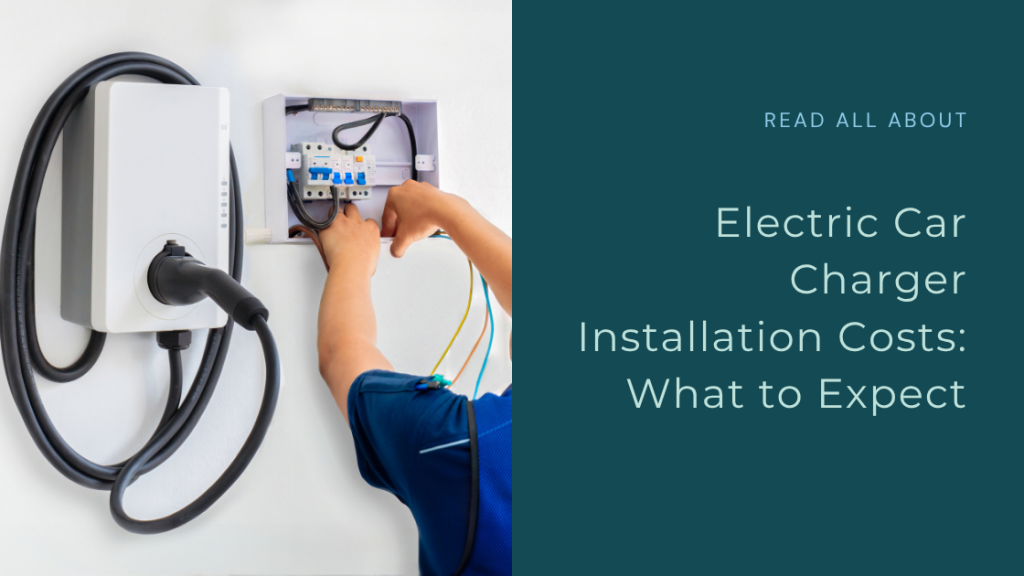Switching to an electric car is exciting: it’s better for the environment, cheaper to run, and honestly, kind of fun to drive. But one thing new EV owners don’t always think about right away is charging at home. Sure, you can use public chargers, but having your own setup makes life way easier. You just plug in overnight and wake up to a full battery every morning. The main question most people ask is, “What’s the cost to install electric car charging stations at home?” Well, it depends on a few things and that’s exactly what we’re going to break down here.
If you’re planning to install electric car charger at home, it’s worth knowing what goes into the process, how pricing works, and what you can expect before you call in the electrician.
Understanding What You’re Paying For
When people hear about the cost to install electric car charging stations, they often imagine it’s just about plugging in a device; but there’s more to it. You’re not just paying for the charger itself. You’re paying for the labor, wiring, permits, and sometimes upgrades to your home’s electrical panel.
If your home already supports the voltage and amperage needed for an EV charger, installation can be quick and fairly affordable. But if your setup is older or limited, you might need extra electrical work, which adds to the price. Think of it like installing a new appliance: the equipment cost is one part, but getting it safely connected is another.
Typical Price Range for Installation
The cost to install electric car charging stations can vary a lot depending on the type of charger. A basic Level 1 charger, which uses a standard 120-volt outlet, is usually the cheapest option because it doesn’t need much setup. The catch is that it charges your car slowly: we’re talking about gaining only a few miles of range per hour.
Most people go for a Level 2 charger, which runs on 240 volts. This one can fully charge your car overnight, but it often needs professional installation. On average, a standard Level 2 installation might run anywhere from a few hundred to a couple thousand dollars, depending on your home’s electrical layout.
If your electrical panel needs an upgrade or the charger has to be placed far from the main power source, expect to pay more. The cost can also depend on whether the charger is wall-mounted, freestanding, or includes smart features like Wi-Fi or app control.
Factors That Influence the Total Cost
Several things can affect the cost to install electric car charging stations in your home:
- Distance from the power source: The farther your charging station is from your electrical panel, the more wiring and materials are needed.
- Electrical capacity: Older homes may need an upgraded circuit breaker or even a new panel to handle the power demand.
- Charger type: Basic chargers are cheaper, but advanced ones with faster charging speeds and connectivity options cost more.
- Permit and inspection fees: Many local areas require permits for EV charger installations. These can add to your overall cost but ensure everything’s up to code.
That’s why getting a quick quote from a professional before starting the job is so important. It helps you understand your total cost upfront and avoid surprises later.
Why Professional Installation Matters
You might think about doing it yourself, but EV chargers aren’t something you want to mess with unless you’re trained. The installation involves high-voltage electricity, specific wiring standards, and safety codes that vary by location. A mistake could damage your car, the charger, or even your home’s electrical system.
By hiring a licensed electrician or a trusted home service like Fixtman to install electric car charger at home, you get peace of mind knowing it’s done safely and correctly. They’ll handle permits, wiring, and testing to make sure everything works perfectly.
Long-Term Savings and Benefits
While the upfront cost to install electric car charging stations might seem like a lot, it usually pays off over time. Home charging is much cheaper per kilowatt-hour compared to public charging stations. Plus, you save time: no more waiting in line at a public charger or driving across town just to top up.
Some local governments and energy providers even offer rebates or incentives to offset installation costs. So, before you install, it’s worth checking what programs are available in your area. You might get a partial refund or tax credit just for going electric.
Choosing the Right Spot for Installation
Where you place your charger matters. Most people install it in their garage or near their driveway so it’s easy to reach the car. Make sure the spot you choose is close enough to your car’s charging port and protected from the weather if it’s outside.
A professional will help you figure out the best place for convenience, safety, and efficiency. They’ll also make sure your charger is mounted at the right height and secured properly, so it’s easy to plug in and unplug every day.
When to Upgrade Your Setup
If you already have a charger but recently upgraded to a newer EV, it might be time to upgrade your system too. Newer cars often support faster charging speeds, and your old setup might not take full advantage of it. A quick inspection from an expert can tell you if you’re due for an upgrade.
And if you’re adding a second electric car to your household, you might need a dual setup or a higher-capacity system to keep both vehicles charged.
Wrapping It Up
At the end of the day, the cost to install electric car charging stations depends on your setup, charger type, and home’s electrical needs. But having your own charger is one of the best investments you can make as an EV owner. It’s convenient, reliable, and saves money in the long run.If you’re ready to make the switch, the easiest way to get started is to reach out to professionals who can install electric car charger at home. They’ll take care of everything from inspection to installation so you can charge up stress-free.



